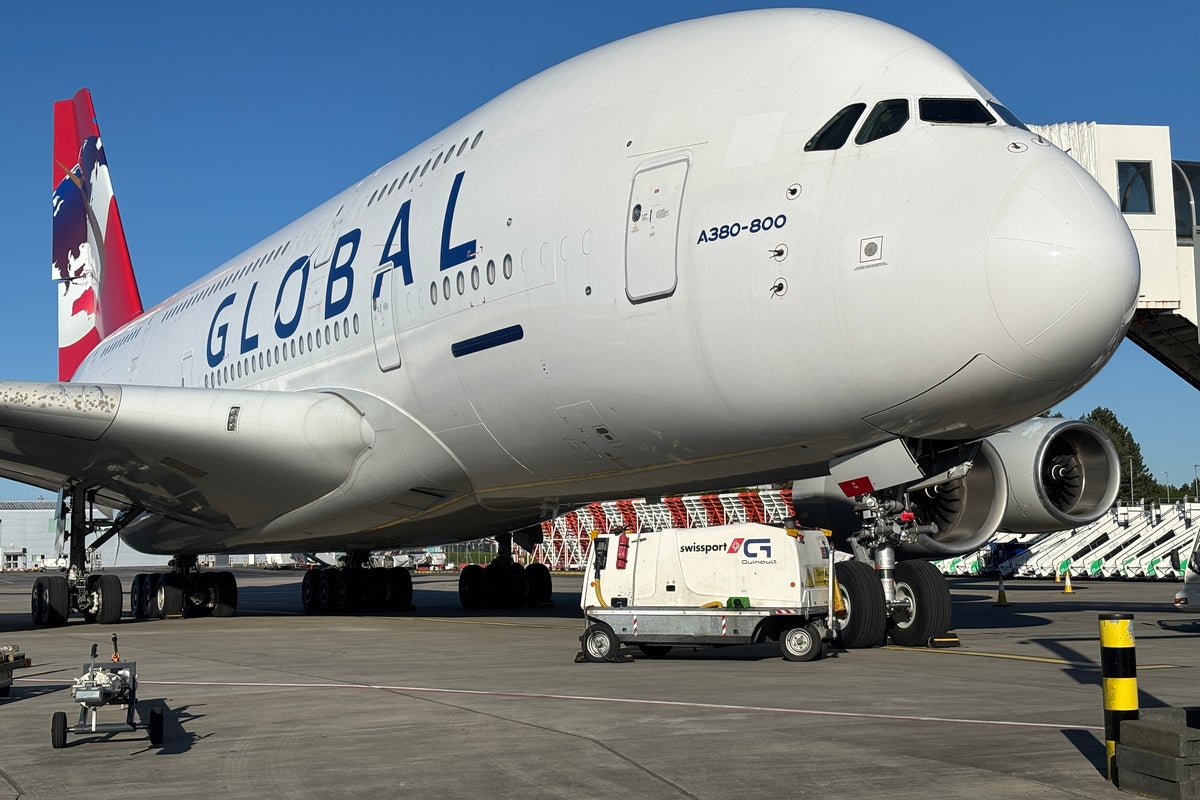The usual Thursday morning bustle at Glasgow airport comprises business people flying British Airways to Heathrow and London City, island-hopping Loganair flights darting off to Barra and Shetland, and a jostle of budget airline departures on easyJet, Jet2 and Ryanair. But shortly after 11am on Thursday 15 May, an Airbus A380 took off to New York – against many predictions, including mine.
The giant Global Airlines plane had spent the previous night tucked in beside the airport’s west security gate, attracting a steady stream of planespotters and photographers as it sparkled in the evening sun.
By the time check-in opened at 8am on Thursday morning, a throng of eager travellers had gathered in the terminal. Many were aviation enthusiasts, including 15-year-old Kyle Schmidt, who had flown in from California with his father, William. Kyle told me: “I found it interesting because it’s an all-A380 airline, and they have a good model of wanting to do nice classes of service.”
Global Airlines was launched in 2021 by a young businessman named James Asquith with a unique proposition: to buy up secondhand “SuperJumbo” jets and fly them from London Gatwick on the busiest routes to the US and beyond.
The Airbus A380 has long been a passenger favourite because of the sense of space, smooth ride and quietness (especially on the upper deck). Emirates has created a highly successful business using more than 100 A380s through its hub in Dubai, including to and from Glasgow. But few other airlines ordered the plane. Many of those who did have grounded some or all of their fleets of the big jet.
The four-engined double-deck aircraft has never achieved the aim of the manufacturer to create the ultimate people-mover to connect the world’s hubs. Airlines prefer smaller and more efficient twin-engined planes. The aircraft graveyards of the world, notably at the French airport of Lourdes and in the high desert of California, are gradually filling with unwanted A380s. Mr Asquith’s vision: to snap them up cheaply, refurbish and redeploy them on the busiest routes.
The initial plans were ambitious. They included a five-class aircraft fitted with a new “gamer” cabin, described as “a revolutionary fifth cabin class between business and premium economy for the modern generation”. Regular transatlantic flights from Gatwick have not (yet) materialised. And after this first transatlantic round trip from Glasgow and a second this month from Manchester, no other commercial flights are currently planned.
The operating structure is unusual. The start-up owns outright the 12-year-old plane, formerly flown by China Southern. But the business of actually flying it is subcontracted to the Maltese subsidiary of a Portuguese airline, Hi Fly, which has the necessary licences. The sole sales channel is a Slough-based travel agent named Travelopedia.
One passenger I spoke to before the flight predicted the operation would be “a little rocky at first”, but it looked impeccable to me. You can read my timeline here.
A (reported) payload of just 95 passengers on a plane fitted for five times as many meant inflight service was flawless, at least in the upper-deck economy section. This wasn’t a return to “the golden age of travel” – it was far better than that. Flight HFM380 was easily the most comfortable and fun transatlantic trip I have had. With abundant and tasty food and drink, I’d call it business-class service for an economy fare (no flat beds, but plenty of empty seats to stretch out upon).
The big question is: where, geographically and commercially, does Global Airlines go from here?
In aviation, one specific form of disruption is good for passengers: when an individual with a fresh idea and financial headroom takes on the aviation establishment.
- In the 1970s, Freddie Laker opened up the Atlantic with his no-frills Skytrain
- In the 1980s, Richard Branson launched Virgin Atlantic and compelled British Airways and others to up their game
- In the 1990s, Stelios Haji-Ioannou transformed European flying with easyJet
Each earned a knighthood for their vision of increasing competition and democratising flying.
Asquith wants to raise standards. It remains to be seen whether a start-up flying a large aircraft in a crowded market is what the travelling world needs. But while the airline and the market sort themselves out, I hope you may take up an opportunity for superior transatlantic travel afforded by deep-pocketed investors aiming to, well, make aviation great again.






